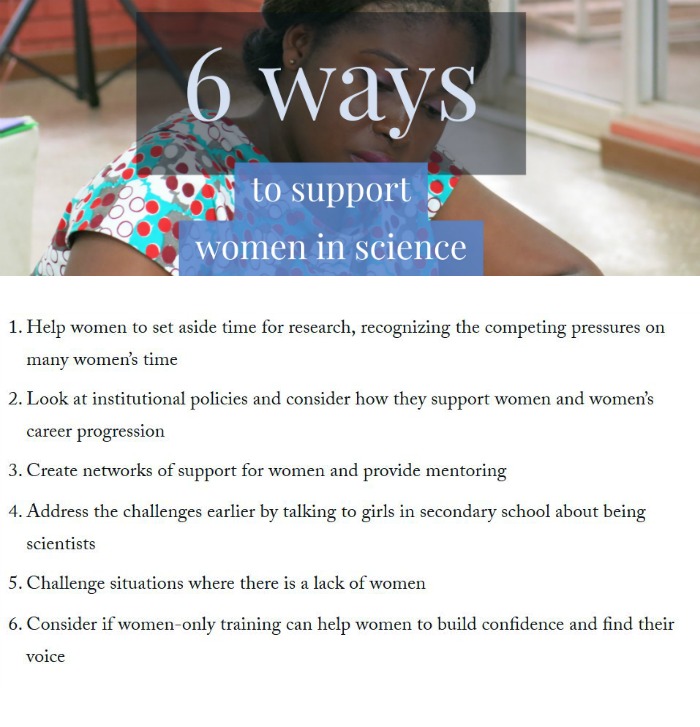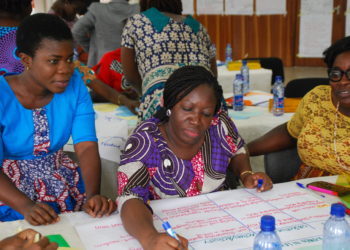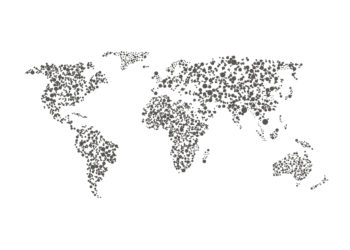In November I wrote a post about gender inequity in higher education and about some of the particular issues and challenges in the Global South.
Over the past few months at INASP (where I am Publications and Engagement Manager) we’ve been talking to some of the inspiring women with whom we work, to produce a set of six interviews showing how these women are making a difference. This collection was published for Sunday’s International Day of Women and Girls in Science.
The interviewees, from Tanzania, Kenya, Nepal, Somalia and Sierra Leone, bring a wealth of different experiences and perspectives and their stories are exciting and inspiring. Many of the interviewees bring perspectives of past or present work in Europe or the USA, and many common themes emerge between countries.
Balancing time
In particular, balancing time between research and expectations of home life was a common theme across countries and continents.
Librarian Miriam Conteh-Morgan, who returned to Sierra Leone five years ago after many years working at Ohio State University, USA shared her own experiences:
Whatever career advancements or academic advancements I’ve made have all revolved around family life. For example, when training to be a librarian I didn’t do this full time but part time so then I could just do two classes a week. I would be sitting in my evening classes doing my grocery list as I needed to shop on my way home.
This is a common experience for professional women who are mothers and was shared by many of the interviewees.
However, perhaps more subtle was the observation of Kenyan-born Dr. Mary Murimi, who is a professor of nutrition at Texas Tech in the USA. She pointed out that the need for women to be a support at home to children and others often transfers into a work context. Female academics, she noted, will find themselves taking on roles supporting others in their work life and that this is sometimes at the expense of their own professional development. What’s more, this pattern of taking on a supporting role can influence how women in science are perceived. As Mary explained:
…the world of men and outside individuals also look at you as support and sympathize with your many roles and don’t expect you to rise above them. … And sometimes the fact that the external world confirms how we feel means we get comfortable in those roles.
This shared perception of women in a supporting role rather than as leaders may partly explain another common observation, that there are often few women in senior positions. This issue was what led Dr. Mariam Hamisi and a couple of colleagues at the University of Dodoma in Tanzania in 2014 to approach INASP about working together on gender mainstreaming (see more about that here).
And women can be underrepresented at all levels of research. Mary recounted the story of a conference in Ethiopia on infant nutrition a few years ago where the audience was entirely male despite the reality that women are usually much more heavily involved in feeding children than men. Mary said she asked at the time whether men teach women to breastfeed.
Similarly, Sahro Ahmed Koshin recalled a conference about higher education in Somalia where she was the only woman and how she changed her whole presentation in order to address this issue:
I said: ‘What’s happening, we’re leaving half of the community, half of the population, we’re speaking about Somalis and there aren’t many Somalis here, and we’re speaking about Somali women, and it’s very important to have their input as well in knowledge production.
How can we support women in research?
One key question that we asked each interviewee was: how can we support women and girls who are interested in pursuing research? The answers are summarized in a ‘Top tips’ page that we created:
How can women and girls help themselves?
We also asked about advice for women and girls who want to go into research and pulled together another set of ‘Top tips’:
 Focusing and time management were important themes running through all the interviews. A practical piece of advice from Dr. Eli Pradhan, an ophthalmology researcher, consultant, and journal editor in Nepal, is to ensure women are picking fields that they are interested in and then ask for help and support if they need it:
Focusing and time management were important themes running through all the interviews. A practical piece of advice from Dr. Eli Pradhan, an ophthalmology researcher, consultant, and journal editor in Nepal, is to ensure women are picking fields that they are interested in and then ask for help and support if they need it:
If they are interested but finding it a bit difficult to get the time they can speak with their bosses to provide specific time slots for research.
And the areas of supporting and support are interwoven, as Kenyan doctor Dr. Barbara Burmen summed up:
Develop a supportive network both at work and at home; be willing to ask for and accept help both at home and in the workplace. Find time to mentor others and always know in the back of your mind that you are an inspiration to other women (and men alike) who are known or unknown to you. Above all, be exceptional at what you do, and your gender will not matter!
The full set of interviews can be found here.
Discussion
7 Thoughts on "Women in Research: Stories from the Global South"
Dear Siân,
Thank you for this enlightening article which resonates in so many ways. I’d like to ask for your help in raising awareness about a project called Girls InSpace that aims to empower and motivate girls to lead the next generation of STEM (item #4 in your list of ways to support women in science). My friend and colleague Alessandra Pacini who is a mom, professor, and space physicist put together a beautiful collection of books that engage youth with fun and identifiable storylines and cool graphics simultaneously introducing scientific concepts with a hands-on approach. Eventually these books will be supplemented with lesson plans, apps, web content and virtual reality – placing an emphasis on using technology as learning tools.
The main objective of Girls InSpace is to combat gender inequality in STEM and to strengthen education and outreach efforts underway at home and abroad. I know you care about these issues as well. Would you please consider supporting this initiative?
Thank you Dawit. This sounds an interesting project. INASP, which I work for, does not work with children or in primary/secondary education (the recommendation about speaking in schools, as with all the recommendations, came from the women I interviewed rather than me). However, by all means, share some more about the project in this comment thread. I would guess people will want to know a URL to find out more information and any social media links people can follow as well as something about your plans, for example where you plan to share these books (I Googled and it looks like you are in Brazil; is that right? Having the books in three languages is impressive).
Thanks Siân, I tried including hyperlinks in my previous message but it appears they were stripped out. Let me try again: http://kck.st/2EvFdRc
I am in Washington DC, but my partner (and author of the collection), is from Brazil though currently working at the Arecibo Observatory in Puerto Rico.
Cheers,
Dawit
I agree with all of the tips except 7. ‘Above all, be exceptional at what you do, and your gender will not matter’. Very few people are exceptional and I believe this is an unrealistic goal to place at women’s feet and can often discourage their progression when they inevitably find they aren’t perfect. You don’t have to be exceptional to do a good job, you don’t have to be exceptional to have the same rights to a job as your male peer. Studies have shown that women underestimate their abilities and men overestimate theirs. I would instead say that you need to persevere, you may not get it right the first time but you need to be willing to learn, try again and persevere. You don’t have to be the best.
Thank you Kate. You raise a great point; by definition, not many people can be exceptional otherwise they aren’t exceptions! I think perhaps we could have worded it as something like ‘strive to be exceptional’. I believe the comment was intended to encourage and inspire female researchers rather that to suggest a need for women to be exceptional in order to compete with unexceptional men.
After that important clarification, I guess the challenge in striving to be exceptional is how to keep motivated and not be discouraged if/when you find you aren’t, as you point out in your comment. In Mary’s interview (in the full interview, linked from this article, which I recommend) she observed how gender tends to make a difference to how people handle failure, with female researchers more likely than male researchers to want to give up if their paper is rejected. We see the same issue when we run AuthorAID research writing courses; men who have never had a paper published often rate their skills in research communication more highly than women who might have two or three papers already to their name.
So, yes, as you say, it’s important to persevere and be willing to learn and try again. Thanks.
Thanks for your response.
I’ve also read research how women are more likely to drop out of university compared to males with the same grades as they judge themselves more harshly. There is interesting TED talk on how to teach girls to be brave not perfect (https://www.ted.com/talks/reshma_saujani_teach_girls_bravery_not_perfection). So I’ve just been thinking a lot about how women can be discouraged when they are not the best and how to change that. When boys and girls who have the same grades in science the boys are more likely to consider a career in STEM compared to girls, as they don’t think they are good enough.
Interesting. Reflecting on your commments in a personal capacity (not related to INASP), I would like to think I was immune to these things but, if anyone asked, I would probably describe myself a pretty mediocre chemist who spent most of my PhD lugging nitrogen cylinders up from the basement. I certainly recognize in myself Mary’s comments about playing a supporting role to fellow researchers. In reality, my three-year PhD resulted in 10 peer-reviewed journal papers that I believe have all been cited several times and, nearly two decades later, continue to be cited. I wonder if it is only because I had the privilege during those research years to hear a couple of brilliant Nobel prize winning chemists speak for comparison or if there is a subconscious gender lens in my rating of my own research as mediocre.



